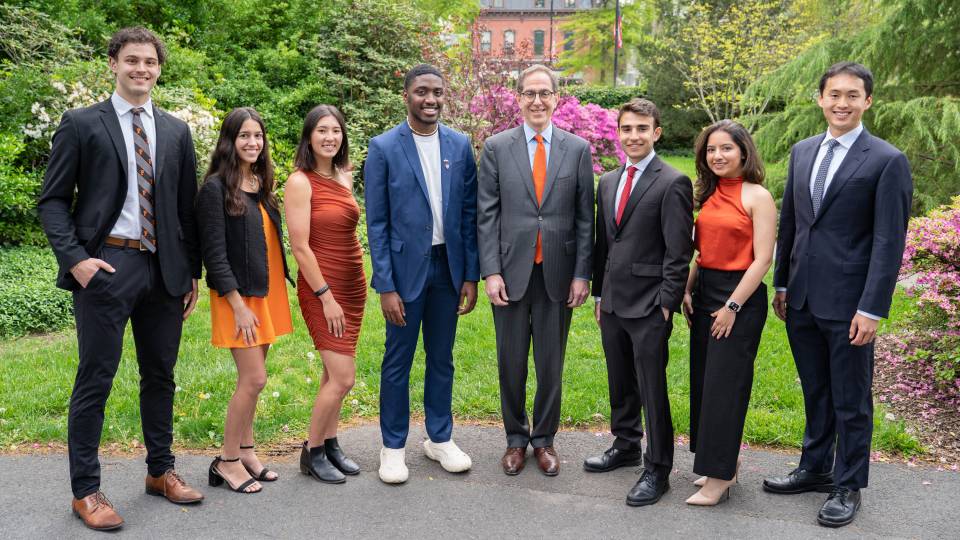Four Princeton University faculty members have been named recipients of the Graduate Mentoring Awards by the McGraw Center for Teaching and Learning and the Graduate School and will be honored during the Graduate School’s Hooding ceremony at 4:30 p.m. on Monday, May 29.
The award winners are Elizabeth Davis, associate professor of anthropology; Luc Deike, assistant professor of mechanical and aerospace engineering and the High Meadows Environmental Institute; Kinohi Nishikawa, associate professor of English and African American studies; and Lindy McBride, assistant professor of ecology and evolutionary biology and neuroscience.
The mentoring award recognizes Princeton faculty members who nurture the intellectual, professional and personal growth of their graduate students. Graduate students nominate faculty members for the award, and they serve on the committee that selects the winners along with faculty members and senior staff from the McGraw Center and the Graduate School. The award honors faculty in each academic division and includes a $1,000 prize and a commemorative gift.
Elizabeth Davis

The research and writing of Elizabeth (Lisa) Davis, a faculty member since 2009, is grounded in the Ottoman history of the Greek-speaking world and focuses on the intersections of psyche, body, history and power.
“Class discussions with Lisa always felt like a stimulating discussion with an old friend,” remarked one student who recommended Davis for the award. “Lisa knew exactly when to intervene and when to let the students work through a topic on their own.”
Students also valued Davis’ mentorship on how to be an effective teacher — she demonstrates “a deep commitment to pedagogical education,” said one — as well as her warmth and down-to-earth manner. “She always listens to her students with an open mind and scholarly respect,” a student wrote.
Another student observed that Davis’ scholarly approach served as a model for their own development as an academic: “Dr. Davis has taught me the necessity of going my own way and trusting my gut as much as she has modeled what it means to be an ethical, compassionate and rigorous scholar. That is to say, she is the rare advisor who is truly deserving of the title mentor.”
Luc Deike

Luc Deike
A faculty member since 2017, Luc Deike focuses on fundamental physics problems, motivated by their importance in environmental and industrial applications as diverse as the statistics of waves in the ocean, floating ice sheets, and oil spill mitigation strategies.
Several students praised Deike for sensing when they felt overwhelmed and offering them reassurance. One student recalled meeting with Deike after coming up short on some research goals. “I remember trying to act like everything was fine,” the student commented. “Luc saw through to my concerns and told me to focus on my classes, assuring me that we would figure out the research later. While it seems like such a small thing in retrospect, it meant a lot to me at the time. Since then, I’ve seen that Luc has an uncanny ability to sense when I am frustrated with myself and then offer encouragement.”
Others praised Deike for offering “generous time” and substantive support at every stage of a graduate student’s life, from early research to the general exam to the job search. “Luc is a phenomenal advisor because I trust him to simultaneously support and challenge me,” wrote one student.
Praising his kindness and encouragement, one student commented: “The way he carries himself as an adviser has convinced me to push towards my goal of becoming a professor in the future.”
Kinohi Nishikawa

Kinohi Nishikawa
Kinohi Nishikawa joined the faculty in 2014. He studies 20th- and 21st-century African American literature, book history, and popular culture.
“He is the kind of professor and mentor I aspire to be for my own students,” one student commented, observing that Nishikawa has his students’ projects “in the back of his mind at all times — often passing along academic and professional opportunities (conferences, symposia, funding, etc.) he feels are appropriate to our research interests.”
Other students were grateful for Nishikawa’s deep interest in not just their intellectual development but also the rest of their lives as graduate students and beyond. “He is the mentor who gives life advice; he is the mentor who helps to professionally advance students; and he is the mentor who sits with our intellectual work and treats it seriously, raising it to the level of intellectual treatise.”
Another student summed up his influence this way: “I would not have achieved the intellectual and personal growth I did without his mentorship.”
Lindy McBride

Lindy McBride
Lindy McBride, who has been at Princeton since 2014, studies natural mosquito populations to examine the genomic, molecular and neural basis of evolutionary adaptation to human hosts.
Several students cited McBride’s “unhesitating encouragement and support” in everything from research projects to grant writing. “She took the time during a very hectic semester to provide me with the most detailed feedback on a piece of writing that I’ve ever received,” one student said. “She commented on multiple drafts of a grant proposal, line by line, with excellent suggestions for improvement.”
Students also praised McBride for her support both in the lab and outside of it. “Dr. McBride encourages the students to develop themselves professionally outside the lab and give back to the community,” said one student, who appreciated her enthusiasm when he expressed an interest in mentoring first-generation, low-income undergraduates.
“Lindy is both a phenomenal mentor and a wonderfully compassionate person,” said another student. “She has made it clear she will continue to be a staunch professional ally for the rest of my career.”























